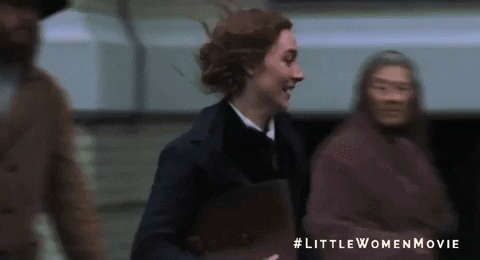On Adaptation, Money, and Friendship
- Jess Hutchinson
- Jan 7, 2020
- 4 min read
Updated: Jul 7, 2022
How does Little Women do so much right?

There is no shortage of think pieces on LITTLE WOMEN and the genius of Greta Gerwig and her ensemble. But buckle-up, babies, because here comes another one. Since I can’t stop thinking about the beauty, earnestness, the goddamn love, and expert craft with which this movie has been infused, I am going to write about my heart-felt gratitude and wonder, put it in the electronic envelope of this blog, and use my ribbon-laden key(board) to place it in the little wooden post office of the internet.
Let’s talk about Adaptation, Baby
Can we just? For a moment? Talk about how Gerwig has used Time as a Narrative Structure in order to make this story vital, alive, and full of that good, sweet ache from start to finish? If you can watch this film and not think about the ways in which your past echoes into your present and/or not feel nostalgia for a childhood real or imagined, I just don’t know what to say to you except that you may in fact need medical attention.
And that is what makes this film such a brilliant adaptation. This film has a POINT OF VIEW. It has some shit that Greta Gerwig wants you to sit up and pay attention to. And this is what is so beautiful about taking a story from one form and placing it into another, which – for my money – is only something you need to do if you have something to contribute to the conversation. It’s clear that Gerwig has great love for all of these characters. That’s evident in the complexity her screenplay has allowed each one to have. It’s also clear that she believes this text has important ideas to contribute to a contemporary conversation, because this film, while being undeniably set in its original time and place, is also SO ALIVE with contemporary energy. These characters feel immediate because the actors have been encouraged to create them with all the messy, contradictory, beautiful vitality of REAL HUMANS. To imbue that in a text that’s over 100 years old – this is why adaptations exist: to honor the original work by creating something alive with the singular energy of the artists adapting it.

Romance, Marriage, and Money
I LOVE how much this movie talks about money. Not only do we get to see Jo travel from “grateful for less than the standard” to “Fuck You Pay Me And I’ll Keep The Copyright Thank You,” we get to see how money has ALWAYS been a social issue. It is complicated and messy and impolite – just like real money – and thanks to capitalism and misogyny and classism, we have been stoking the divides that result from it since before this country was founded. And while I may not have the same concerns that Amy lays out for Laurie when it comes to ownership of cash that a mid-19th Century woman had, you are not paying attention if you think marriage is no longer an economic proposition (ask me sometime about the 401k that I had to get MY HUSBAND’S PERMISSION to roll into an IRA even though I had not yet MET him when I earned that money).
Romance is complicated. Economics are complicated. Class is real and complicated. And this film does the interconnectedness of these things justice better than just about anything else I’ve seen.

Friendship
The phrase “More Than Friends” has always struck me as super reductive. It sets up a false hierarchy in which friendship is great, but of lesser value than romantic relationships. See also: “just friends” as if there is something of inherent lesser importance to non-sexual companionship. But this is what we see – everywhere – the primacy of finding a romantic partner over cultivating friendships and – as we learned from When Harry Met Sally (don’t @ me, I love that movie), an inability for people who might be romantically inclined toward each other to be friends because the sex always gets in the way. If there is an intense, immediate connection – we’re told – the feeling must be romantic. And if it’s not, it’s somehow less-than: just friends. Less than lovers.
Enter the remarkable journey of this Jo and Laurie. Here they are to show us both the way that the cultural obsession with romance can lead us to read connection as romantic love AND ALSO the difference between loving someone and being in love with them. Who knew that there are different, equally valuable ways to love people? Greta Gerwig, apparently. She is the genius I needed when I was 15 (and 25 and 35 and forever). Friendship is vital. And beautiful. And sometimes gets confused with romance, but there is HOPE for changing that script.
This film is beautiful and heart-forward. It is, as a friend pointed out: sublime. And in this time of so much ugliness, snark, and fear, I am grateful for art that is sublime and crafted with so much love and such a wise and loving point of view. It’s the kind of art I want to make, and it’s sure as hell the kind of art we could use more of.
Thanks, Greta. I don’t want to imagine our lives without you in them.




Comments